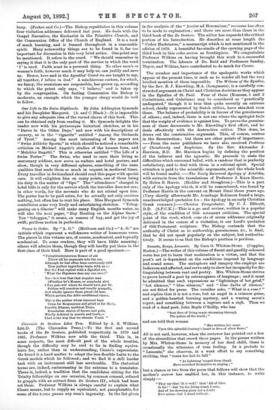Sonnets, Songs, Laments. By Cara G. Whiton-Stone. (Cupples, Boston.)—The writer
of this volume of fluent and gaudily-coloured verse has yet to learn that moderation is a virtue, and that the poet's art is dependent on the conditions imposed by language and sound sense. The metaphors and imagery she employe are ludicrous and affected, and serve only to show her incapacity for dis- tinguishing between rant and poetry. Mrs. Whiten-Stone strives to prove herself a poet by extravagance of language ; and it must be admitted that such expressions as "lightnings of hot grief," "hot silences," "blue silences," and " blue darks of silence," are not fitted for prose. The versifier asks, "What is a rose F" and replies that it is not a rose, but an angel in a crimson guise, and a golden-hearted burning mystery, and a waning moon's regret, and something between a rapture and a sigh. Then we read of a dead poet, John Boyle O'Reilly, who has "Sent fires of living music streaming through The pulses of the world ; "
and are told that woman
" Has written her name Upon this splendid Century's heart in fires of silver flame."
All is not said, however, when the reviewer has pointed out a few of the absurdities that crowd these pages. In the poems written by Mrs. Whiten-Stone in memory of her dead child, there is occasionally the utterance of true feeling. In a prelude to "Laments," she observes, in a weak effort to say something striking, that "tears too hot to fall" " As lightning 'soaped from thrall Have scorched themselves to singing ; "
but a stanza or two from the poem that follows will show that the mother's sorrow has enabled her, in this instance, to write simply :—
•• They say that 'It is well I ' that ' All of- bliss Is his '—but 'tis the living touch I miss. And of his dawning glory not a doubt Ever arises—but I stand without : It needs a higher faith than mine to see,
Althcngh I know his peace, that 'It is well ' for me.
My tender little boy; I dare not think Of all his fond endearments; lest I sink To desolation ;—Was it not too much To hope to keep him, when I knew that such ' As angels do their Father's face behold ? And lilies soonest white are planted in the fold ?
Ah, 'they that sow in tears, in joy shall reap;' And I some day all tired may fall asleep,
And in one moment find my boy again,—
Learning through Christ the blessedness of pain.
God's aftermath is sweeter than the bloom, And Heaven shall make most clear what Earth has veiled in gloom."
These lines are of no special worth as poetry, but they express clearly what the author wishes to say, and are welcome as a con- trast to the high-falutin style in which so much of her verse is written.



































 Previous page
Previous page